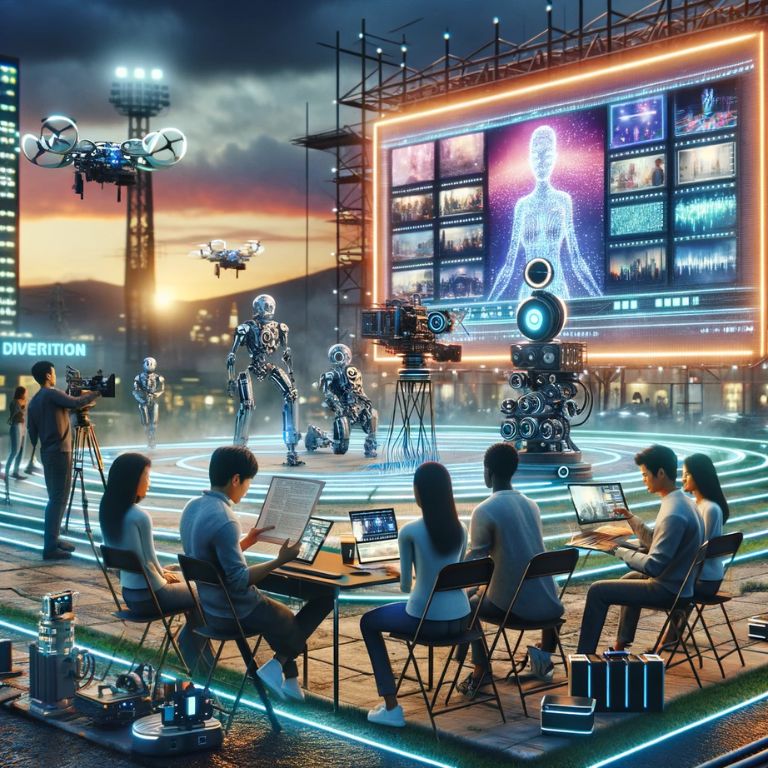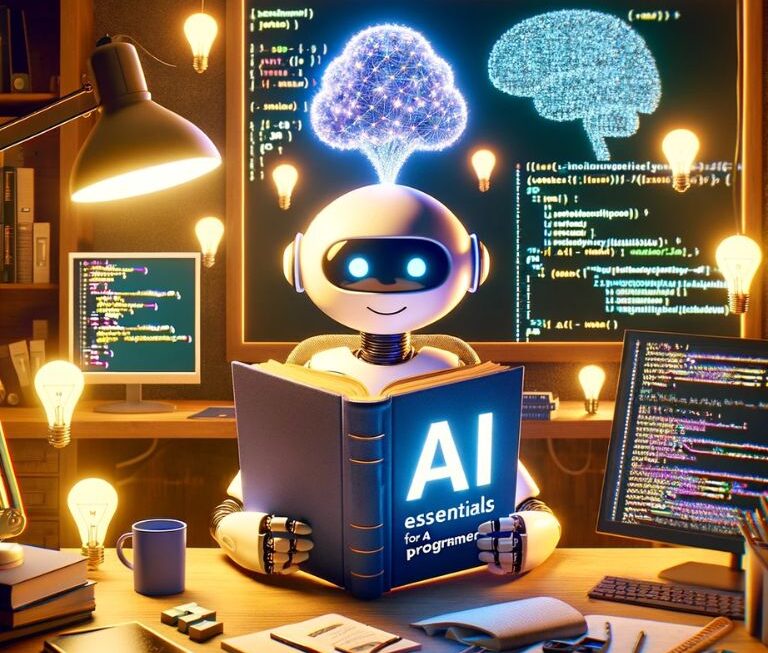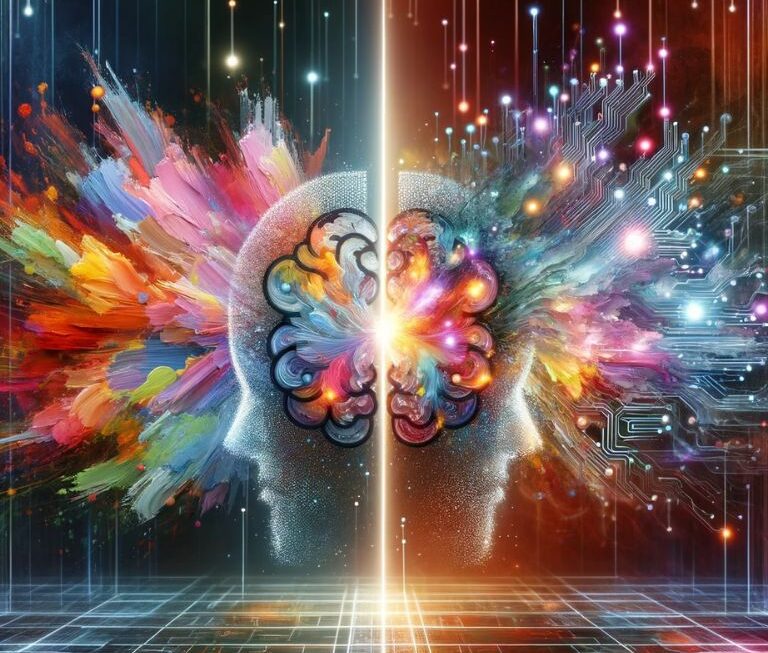The film industry, an ever-evolving landscape of storytelling and technological innovation, has entered a new era marked by the integration of Artificial Intelligence (AI). This transformative journey from traditional filmmaking to AI-enhanced processes signifies a paradigm shift in how movies are conceived, produced, and distributed. The impact of AI is not just a futuristic concept but a present reality, reshaping the very fabric of cinematic experiences.
The Evolution of Filmmaking
To appreciate AI’s role, it’s essential to understand the film industry’s historical context. From the silent film era to the advent of color and sound, each technological advancement has significantly altered cinematic storytelling. The introduction of digital technology marked a pivotal change, paving the way for computer-generated imagery (CGI) and advanced visual effects (VFX). However, AI’s emergence in filmmaking is perhaps the most groundbreaking of all. Unlike previous advancements that enhanced visual aesthetics, AI is transforming the core processes of filmmaking itself.
AI in Modern Filmmaking
AI’s integration into the film industry is comprehensive, impacting scriptwriting with narrative analysis and character development support. In pre-production, it aids casting and scheduling. During filming, AI enhances precision. In post-production, AI excels in editing and VFX, reducing costs and time. AI extends its reach to marketing and distribution by predicting trends and optimizing strategies for box office success, spanning the entire film production lifecycle.
Navigating the AI-Driven Cinematic Landscape
As we embark on this exploration of AI’s role in filmmaking, it’s crucial to recognize that we are not just discussing technological advancements but a fundamental shift in how stories are told and experienced. This article will delve into each stage of the filmmaking process, uncovering the depth and breadth of AI’s impact. From scriptwriting to post-production, we will explore how AI is not only enhancing existing methods but also creating new possibilities for filmmakers and audiences alike.
Scriptwriting Enhanced by AI
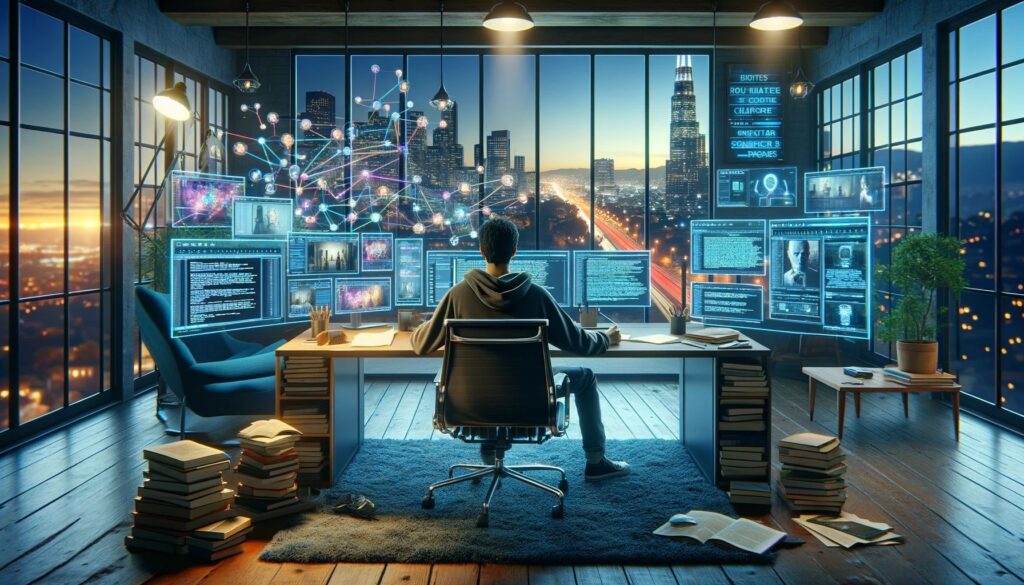
How AI Tools Aid in Script Development
AI has brought a profound transformation to scriptwriting. AI algorithms analyze extensive script databases, uncovering narrative patterns and character development insights. This empowers writers to enhance their stories, aligning with audience expectations. AI tools offer plot twists, character arcs, and dialogue suggestions, combining human creativity with data-driven insights. This synergy yields cinema with more engaging, diverse, and compelling narratives, reshaping the script development process.
Examples of AI-generated Scripts and Their Impact
- Sci-Fi Spectacle: AI analyzed popular sci-fi scripts, generating a critically acclaimed movie blending familiar tropes with fresh twists.
- Romantic Comedy: AI-assisted dialogue in a rom-com script resulted in a box office hit with witty and engaging conversations.
- Historical Drama: AI ensured period accuracy in dialogue and setting, enhancing script credibility and immersion.
- Horror Genre: AI crafted a unique horror script with innovative scare tactics and psychological elements.
- Independent Film: AI co-wrote an original script, blending the director’s vision with current cinematic trends, gaining festival attention.
Casting and Pre-production
AI’s Role in Casting Decisions and Pre-Production Planning
AI is transforming casting and pre-production, traditionally guided by human intuition. In casting, AI analyzes actors’ profiles and past work, suggesting ideal candidates and expediting selection. In pre-production, AI optimizes schedules, budgets, and logistics through data analysis, enhancing efficiency and creativity. This integration not only streamlines pre-production but also expands casting and planning possibilities, revolutionizing how the film industry approaches these critical phases.
Examples of Casting Tools Powered by AI
- Inclusive Casting for a Blockbuster: AI ensured diverse casting, suggesting a talented and representative cast, boosting global appeal and acclaim.
- Independent Film Discovery: AI casting found an unknown actor perfectly fitting the lead role, resulting in a breakout performance.
- A-list Schedules Optimized: AI coordinated schedules for a multi-star project, reducing delays and costs efficiently.
- Language Matching in Historical Drama: AI cast actors with specific accents, adding authenticity to the film.
- AI Audition Assessment: AI analyzed audition tapes for emotional expression and suitability, streamlining casting decisions.
AI in Filming and Direction
The Use of AI in Camera Work and Directing Scenes
AI is reshaping filming and direction with cutting-edge camera work and scene guidance. AI-driven cameras capture precise shots, adapting to lighting, movement, and composition changes in real time, unlocking dynamic shooting possibilities. Directors utilize AI to pre-visualize scenes, aiding in planning complex sequences like action scenes or large crowds efficiently. This AI integration isn’t just a technical advancement but a creative revolution, empowering filmmakers to expand the horizons of traditional cinematography and direction.
Analysis of AI-Directed Film Projects
AI-driven film projects merge technology and art. In one instance, AI directed a short film after analyzing award-winning films, resulting in a visually stunning piece with narrative coherence. In another, AI collaborated with human directors, suggesting camera angles and shots based on script emotions and plot progression, creating technically impressive, emotionally resonant work. These projects highlight AI’s potential for creative innovation in filmmaking, shaping cinema’s visual language and storytelling possibilities.
Post-Production and AI’s Magic
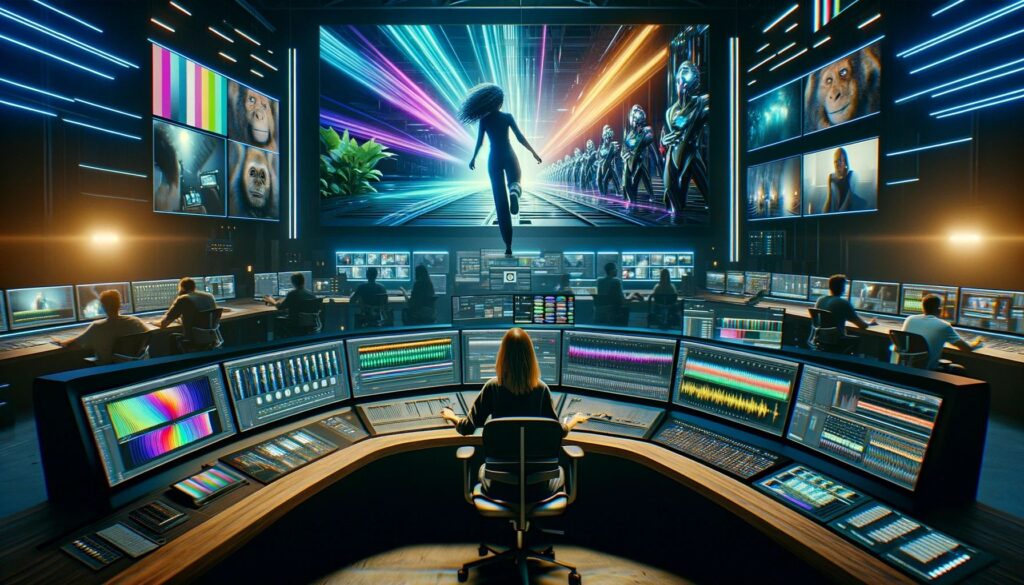
AI’s Contributions to Editing, VFX, and Sound Design
In the post-production phase, AI’s contributions are diverse and transformative:
- Editing: AI swiftly selects the best takes, streamlining editing and freeing up time for creativity.
- VFX: AI automates complex VFX tasks, speeding up the process and expanding visual storytelling options.
- Sound Design: AI synthesizes sound, adjusts audio elements, ensuring impactful soundscapes.
- Color Grading: AI consistently and efficiently grades scenes, preserving visual tone and mood.
- Language Dubbing and Subtitles: AI ensures accurate, natural translations, enhancing global accessibility.
Discussing AI’s Efficiency in Post-Production Workflows
AI’s role in post-production greatly boosts efficiency and quality. By automating tedious tasks, it liberates post-production teams to concentrate on creative decisions and refining aesthetics and storytelling. For instance, AI editing tools can analyze actors’ emotional performances and suggest impactful edits. In VFX, AI accelerates complex visual element creation, fostering creative experimentation. This efficiency not only saves time and costs but also enhances the final product’s quality, enabling filmmakers to realize their vision with precision and creativity.
AI in Film Distribution and Marketing
How AI Predicts Film Success and Assists in Marketing Strategies
AI has become a critical player in film distribution and marketing, offering valuable insights and strategies to maximize a film’s success:
- Audience Analysis: AI predicts preferences for targeted marketing.
- Box Office Predictions: AI forecasts success, aiding release strategies.
- Content Recommendation: AI recommends films on streaming platforms.
- Social Media Analytics: AI monitors sentiment and trends.
- Personalized Marketing: AI creates tailored content for higher engagement.
Real-World Examples of AI-Driven Film Distribution
- Netflix’s Content Recommendation: AI tailors content recommendations, enhancing user satisfaction.
- Warner Bros.’ Box Office Predictions: AI aids release dates and marketing, improving revenue projections.
- Disney’s Personalized Marketing: AI customizes trailers for diverse audiences.
- Paramount Pictures’ Social Media Insights: AI monitors social media for agile marketing.
Ethical Considerations and Future Outlook
Addressing the Ethical Implications of AI in Filmmaking
As AI continues to permeate the film industry, it brings with it a set of ethical considerations that demand careful examination. Some key ethical concerns include:
- Bias and Representation: AI algorithms may inadvertently perpetuate biases present in the training data, resulting in inaccurate portrayals or underrepresentation of certain demographics in films.
- Creative Control: The use of AI in scriptwriting and direction raises questions about authorship and the role of human creativity in filmmaking. Who owns the creative decisions made by AI?
- Privacy: AI-driven audience analysis and marketing strategies involve the collection of personal data. Ensuring the privacy and consent of individuals is crucial.
- Job Displacement: While AI streamlines many aspects of filmmaking, it also raises concerns about potential job displacement in traditional roles.
- Transparency: Filmmakers must be transparent about the use of AI in their projects, especially when AI is involved in creative decision-making.
Predictions for AI’s Future Role in the Film Industry
Looking ahead, AI’s role in the film industry is poised to expand and evolve:
- Enhanced Creativity: AI will increasingly collaborate with human creators, assisting them in generating novel ideas, exploring new genres, and pushing creative boundaries.
- Diverse Storytelling: AI will help diversify storytelling by offering fresh perspectives and allowing for more inclusive narratives that represent a wider range of voices and experiences.
- Efficiency and Cost Reduction: The film production process will become more efficient and cost-effective, enabling smaller studios and independent filmmakers to compete on a larger scale.
- Audience Engagement: AI will continue to personalize audience experiences, recommending films that align with individual preferences and providing immersive interactive experiences.
- Ethical Guidelines: The industry will establish ethical guidelines and standards for the use of AI, ensuring fair representation, privacy protection, and transparency.
Conclusion
The integration of AI into the world of filmmaking has ushered in an era of unprecedented innovation and transformation. From scriptwriting to post-production, casting to marketing, AI’s influence is tangible and far-reaching. It has not only streamlined processes and improved efficiency but has also opened up new creative possibilities, diversified storytelling, and redefined the very essence of cinematic expression. However, as we embrace AI as a creative partner, we must remain vigilant about ethical considerations, ensuring that the technology is harnessed responsibly, promoting inclusivity, and respecting the privacy of individuals. As we stand on the threshold of this cinematic revolution, it’s clear that AI is not just a tool; it is a catalyst for reimagining the art and business of filmmaking, promising a future where innovation and storytelling know no bounds.

